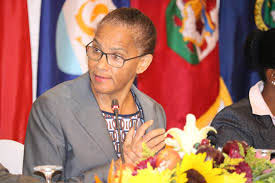With threats to food security in the Caribbean looming large on account of the increasing impact of climate change on the region’s agricultural sector, and more recently, the onset of the COVID-19 pandemic, Caribbean Community (CARICOM) member countries in partnership with the Government of Canada and the Food & Agriculture Organization (FAO) through its “Cooperation for Climate Change Adaptation and Resilience in the Caribbean” initiative are embarking on a drive to help the region adapt to climate change through the application of digital technologies. Information released on the initiative states that it is intended to infuse a sound climate-smart infrastructure into the region’s agricultural sector.
The initiative which represents a response to the challenges facing by the regional agri-foods system in its quest to maximise food production and enhance food security, will feature the increased application of digital technology in the agricultural sector. This approach will include the use of innovative technologies in search of solutions to the climate change-related challenges. It will also seek to enhance the connectivity of all of the actors in the agri-food system in order to reduce inefficiencies.
The challenges confronting the agricultural sector in CARICOM countries are further compounded by the role that climate change is playing with excessive rainfall and erratic temperature patterns.
From March 9 -10, the coalition hosted the first of what is intended to be a series of two-day training sessions on Climate Smart Agriculture Digital Technologies in order to introduce the region to the various technologies and tools available to undertake the desired agenda. Reports on the forum state that it sought to introduce the region to the various climate smart-related technologies and tools available.
Close to ninety participants reportedly attended the training session where one of the key discourses centred on the applicability of the available technologies and tools to in-country application. Discussions also dealt with how gender dimensions can be adopted and applied at the country and institutional levels.
FAO sub-regional coordinator Dr Renata Clarke in her opening remarks at the training session asserted that the region is in need of “innovative technologies and tools that will help us better understand the increasingly complex agri-food systems” and the risks and challenges that attend the pursuit of agriculture. Dr Clarke also reportedly alluded to the need for the region to “develop cost effective, efficient and scalable solutions” that will increase the resilience of the region’s agricultural pursuits.
The training is intended to provide an opportunity for the region to secure a basic understanding of the tools and technology associated with climate-smart agriculture and how these can promote climate-change adaptation in agri-food systems.








